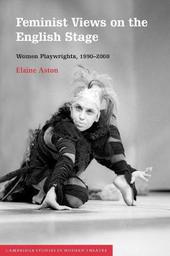
|
Feminist Views on the English Stage: Women Playwrights, 1990-2000
Paperback / softback
Main Details
| Title |
Feminist Views on the English Stage: Women Playwrights, 1990-2000
|
| Authors and Contributors |
By (author) Elaine Aston
|
| Series | Cambridge Studies in Modern Theatre |
|---|
| Physical Properties |
| Format:Paperback / softback | | Pages:250 | | Dimensions(mm): Height 229,Width 152 |
|
| Category/Genre | Drama |
|---|
| ISBN/Barcode |
9780521804677
|
| Classifications | Dewey:822.91409928 |
|---|
| Audience | | Professional & Vocational | |
|---|
| Illustrations |
Worked examples or Exercises
|
|
Publishing Details |
| Publisher |
Cambridge University Press
|
| Imprint |
Cambridge University Press
|
| Publication Date |
24 June 2010 |
| Publication Country |
United Kingdom
|
Description
Feminist Views on the English Stage, first published in 2003, is an exciting and insightful study on drama from a feminist perspective, one that challenges an idea of the 1990s as a 'post-feminist' decade and pays attention to women's playwriting marginalized by a 'renaissance' of angry young men. Working through a generational mix of writers, from Sarah Kane, the iconoclastic 'bad girl' of the stage, to the 'canonical' Caryl Churchill, Elaine Aston charts the significant political and aesthetic changes in women's playwriting at the century's end. Aston also explores writing for the 1990s in theatre by Sarah Daniels, Bryony Lavery, Phyllis Nagy, Winsome Pinnock, Rebecca Prichard, Judy Upton and Timberlake Wertenbaker.
ReviewsReview of the hardback: '... played a valuable part in revaluing what 'Britain' might mean today.' Plays International Review of the hardback: 'The 1990s was not women's decade in the theatre after all, but the fact that not much has changed in the first four years of the new decade makes Aston's book urgent, relevant reading.' The Times Literary Supplement Review of the hardback: 'The book is to be commended for its range of plays ... a very readable study. Its chronological structure is easy to follow ... The book is given a popular appeal that goes beyond people studying or researching theatre as the readings are pertinently linked to popular culture and events reported in the media. ...anyone who lived through the era would find this book interesting and accessible ... This exciting book blends the old with the new and the familiar faces of feminism with the newly emerging forces. It offers a clear analysis of the development of feminist theatre in the 1990s and gives insights into how we can continue to build on it in the twenty-first century. A must read for anyone interested in contemporary English drama.' Contemporary Theatre Review
|